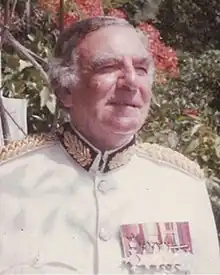James Alfred Davidson
James Alfred Davidson OBE (22 March 1922 – 6 May 2004) was a British naval commander and diplomat. After serving during the Second World War, he joined the Commonwealth Relations Office where he held several posts in Cambodia, Brunei, Bangladesh and the British Virgin Islands.
James Alfred Davidson | |
|---|---|
 | |
| 3rd Governor of the British Virgin Islands | |
| In office 5 November 1978 – 7 November 1981 | |
| Monarch | Elizabeth II |
| Preceded by | Walter Wallace |
| Succeeded by | David Barwick |
| 7th British High Commissioner to Brunei | |
| In office January 1975 – 1978 | |
| Preceded by | Peter Gautrey |
| Succeeded by | Arthur Watson |
| Personal details | |
| Born | 22 March 1922 Portsmouth, England |
| Died | 6 May 2004 (aged 82) United Kingdom |
| Spouse |
Daphne Merritt (m. 1955) |
| Children | 2 daughters and 2 stepsons |
| Occupation | Sailor Diplomat |
| Military service | |
| Allegiance | |
| Branch/service | |
| Years of service | 1939–1961 |
| Rank | Commander |
| Unit | HMS Hawkins (D86) HMS Inconstant (H49) HMS Calder (K349) HMS Rocket (H92) HMS Childers (R91) |
| Battles/wars | World War II Cold War |
Biography
Early life
James Alfred Davidson was born in Portsmouth, England on 22 March 1922,[1] and was educated at Portsmouth Grammar School and Christ's Hospital, then at the Royal Naval College, Dartmouth. His first posting, as a midshipman, was to HMS Hawkins (D86), but in 1942 he was transferred to the destroyer HMS Inconstant (H49).[2] In 1943 he was appointed first lieutenant of the frigate HMS Calder (K349). A year later, in February 1944, at the age of just 21, Davidson took temporary command of the ship.[2] Davidson joined HMS Rocket (H92) a few months later, an Eastern Fleet destroyer which took part in the Battle of Penang. He trained to be a pilot and later served as executive officer and first lieutenant on HMS Childers (R91).
Diplomatic career
In 1951 he was posted as naval liaison officer to the Chinese Nationalist Government. He married his wife Daphne Merritt in 1955. He joined the Commonwealth Relations Office (CRO) in 1960. His first assignment was as first secretary in the newly independent Trinidad. In 1969, he was posted to Phnom Penh, Cambodia, where he witnessed the overthrow of Prince Sihanouk. He continued to serve until the Khmer Rouge fully took over the country.[2]
Davidson wrote a book on the region in 1979: Indo-China: Signposts in the Storm.[3] He was appointed OBE in 1971. After the India-Pakistan war, he become deputy high commissioner in East Pakistan, which was soon become Bangladesh. In this position, Davidson took part in negotiations on Indira Gandhi's visit to Bangladesh in March 1972.[2] His next two appointments were to Brunei as High Commissioner and as Governor of the British Virgin Islands.[2]
Later life
Davidson retired from the Diplomatic Service in 1981.[4] He continued to take up several other positions including as a visiting fellow at the London School of Economics he decided to do a pupillage at the Admiralty Bar. He was a member of the inquiry into the sinking of the MS European Gateway.
Bibliography
- Davidson, James (1979). Indo-China, Signposts in the Storm. University of Michigan: Longman. ISBN 9780582726031.
Honours
James Davidson was given he honorary title of Yang Terutama (His Excellency) by the Government of Brunei.[5] He has also earned the following honours;
_Ribbon.svg.png.webp) Order of the British Empire Officer (OBE)
Order of the British Empire Officer (OBE)
References
- "Davidson, James Alfred". WHO WAS WHO 2023. Retrieved 5 October 2023.
- "James Davidson". Times Newspapers. 3 June 2004. ISSN 0140-0460. Retrieved 9 April 2021.
- Davidson, J. (James) (1979). Indo-China, signposts in the storm. Singapore : Longman. ISBN 978-0-582-72603-1.
- Joyner, Tammy (21 October 1982). "James Davidson: Diplomat Says International Scene Similar to Pre-Hitler Germany". The Charlotte Observer. p. 77. Retrieved 9 April 2021.
- "Brunei dan Britain terus jalin persahabatan" (PDF). Pelita Brunei. 5 January 1977. p. 1.